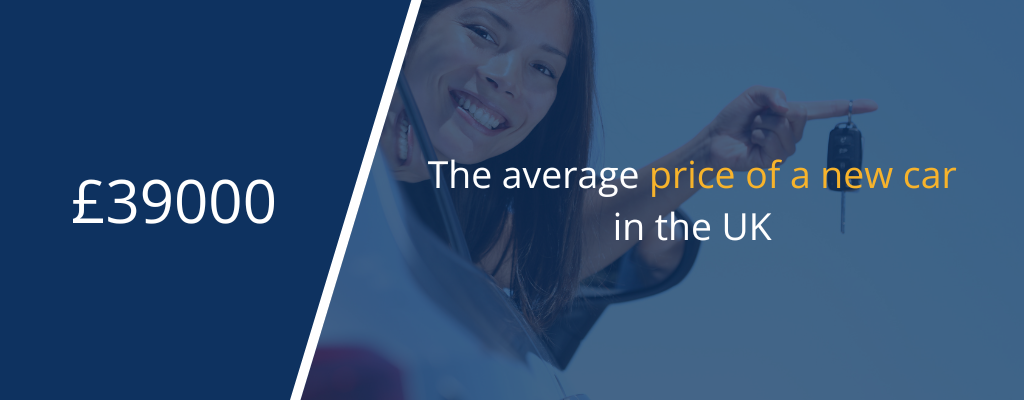
Is Buying A New Car A Waste Of Money?
Decide Whether Splashing Out On A New Car Is The Right Thing For You
It happens to most cars, they start fresh off the forecourt, pristine, shiny and promising years of happy driving to come. Then they hit the road and lose a chunk of value as soon as the wheels start rolling.
Naturally, this conundrum of ‘new car feeling’ vs ‘massive depreciation’ leaves a lot of buyers with the nagging question: is buying a new car really just throwing money away?
With 191,000 new car registrations in June alone, we’re sure it’s a question that many have considered.
On the face of it, the answer might be an obvious yes, but things aren’t always that black and white. In this article, we’re exploring new car buying, including the upsides (and down), to finally answer the question of whether buying a new car is a waste of money.
First, though, as we always do, let’s cover some of the basics.
Is It Best To Buy A Car On Finance Or Cash?
We really can’t make that decision for you, and the idea of whether it’s ‘best’ to choose one or the other depends on a lot of factors.
In simple terms, cash will almost always result in paying less for your car overall. However, with cash, you’ll close off many potential incentives offered by the manufacturer or dealer.
Here are a few things to consider:
- Do You Have The Money To Spare? If you have a cash lump sum sitting around, then paying cash for your car could save you a lot of money in interest over financing.
- Do You Need To Plan For The Future? Using all your savings now might seem like a good idea, but what if things change? Although financing can work out more expensive, it does give you some flexibility and leaves most of your money in your bank for a rainy day.
Will Buying A Car Improve My Credit Rating?

Buying a car on finance could improve your credit score, especially if it helps you build up a record of timely repayments. Not overborrowing and consistency with payments could have a positive impact on your rating.
Conversely, missing payments or financing a car that’s beyond your affordability are quick ways to negatively affect your score.
Regardless, in the short term, there’s a high chance your credit score will have a slight ‘dip’ as you’re taking on more debt.
We’d recommend reading the Experian guide; ‘How Does Buying A Car Affect Your Credit’ for more advice.
Is Buying A Car A Waste Of Money?
The Depreciation Problem
Cars lose value. That’s just how it works; unless you’re tucking away a limited-run Ferrari for 30 years and never driving it.
With new cars, depreciation is especially steep in the early years, with the average car losing up to 35% in the first 12 months, raising to 50% by year three.
So if you pay £30,000 for a brand-new car today, don’t be surprised if it’s worth closer to £15,000 in 36 months, even if you've taken brilliant care of it.
Read More: How Much Do Electric Vehicles Depreciate?
What Are The Benefits Of Buying A New Car?
If you come to terms with the depreciation aspect of buying a new car, there are plenty of upsides to buying a new car.
Here’s a few of the main reasons some drivers opt for a brand new model:
- There’s No History: With a new car, there’s no history to worry about. It’s never been thrashed, crashed, or poorly maintained.
- Manufacturer Warranty: These days, manufacturers typicaly offer a hefty warranty for buyer peace of mind; usually between 3 to 7 years.
- Tailored Finance Options: PCP, leasing, and low-rate HP deals are often geared heavily towards new buyers.As well as this, as we’ve mentioned above, some dealerships and manufacturers will incentivise buyers to ‘go new’, meaning you could get some decent deposit contributions or added bonuses thrown in.
- Better Technology & Efficiency: From hybrid systems to advanced safety features, the newest cars tend to be packed with the latest gadgets and fuel-saving upgrades.
So if you value convenience, peace of mind and being at the cutting edge of technology (both in car and from a safety perspective), a new car might make sense.
Don’t Write Off A Used Car
With depreciation levels up to 50% within just three years, it doesn’t take a rocket scientist to know that a used car can offer some major savings against new.
Used cars, especially those 1 to 3 years old, can represent excellent value. Someone else has already absorbed the brunt of the depreciation, so you’re effectively getting a “like new” model for far less.
Used doesn’t mean risky either. Reputable dealers now offer thorough inspections, warranties, and return guarantees. It’s no longer the ‘wild west’ it once was.
If you are considering a used car and want a little extra peace of mind, you could even look at an additional car warranty, which provides longer and increased protection.
Think About Finance: The Real Cost Comparison
When people ask if a new car is a waste of money, they’re often thinking in cash terms. But let’s be real; most people finance their vehicles now.
Here’s the twist: car manufacturers often subsidise PCP and lease deals on new cars to move stock, sometimes offering 0% APR, deposit contributions, or maintenance packages. Offers which rarely apply to used cars.
So month to month, that new car might not be wildly more expensive than a used one. But (and it’s a big but) you're still paying for a depreciating asset, and the equity position at the end of the term will almost always be lower with a new car.
Whether you buy new or used, it’s worth remembering that financing through PCP, for example, could leave you with negative equity, where you owe more than you’ve repaid at any given point.
If this happens, you could benefit from Gap Insurance, to protect against any financial implications if your car is written off.
Read More: The Complete Gap Insurance Guide
Environmental Benefits Can Be Misleading
Some argue new cars are worse for the environment because of the energy and resources involved in manufacturing. Others argue they’re better because of improved fuel efficiency and lower emissions.
Both can be true. The key here is how long you keep the car. If you change cars every 2 years, the environmental footprint can be larger than someone running a 7-year-old car into the ground. But if you buy new and keep it 10 years? That’s a different story.
It’s also worth noting: if you’re going electric, buying new may be the only way to get access to the latest battery tech, range, and warranty support.
The Emotional Factor
There’s one part of the puzzle all the robust, black and white thinking in the world can’t deal with: how it feels. Driving a new car is exciting. That new car smell, flawless paintwork and peace of mind all feel good.
Sometimes, that feeling is worth paying a premium for. It’s the same reason people buy iPhones on release day. Not everything is about pure numbers.
So ask yourself: are you someone who values the emotional satisfaction of buying new? Or someone who finds more joy in getting a great deal?
So, Is Buying New a Waste of Money?
It can be. If you're chasing status, swapping cars every year, and not thinking long-term, then yes; buying new might be a fast track to burning cash.
But if you:
- Plan to keep the car for a long time
- Can take advantage of subsidised finance
- Value warranty protection and tech
- And the emotional aspect matters to you
then buying new makes sense. Just remember this: the most important part of car buying isn’t when it was made. It’s what makes sense for you financially and emotionally.
The Final Word
If you’re unsure, test both waters. Visit a dealership, compare PCP and leasing offers, but also look at nearly-new stock and ask about total cost of ownership, not just monthly payments.
Remember, whichever way you go, it’s worth brushing up on your buying skills. Take a look at our guide: The Only Car Buying Guide You’ll Ever Need for more information.
Still unsure? Bookmark this guide, take your time, and don’t let pressure be the reason you drive off in the wrong car and as always, drop us a message using social media if there’s a burning question you think we’ve not answered here.
Pin It!













